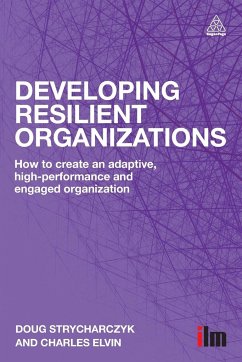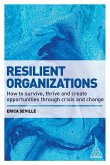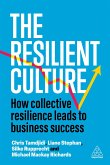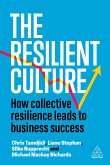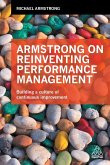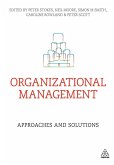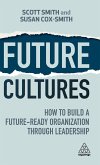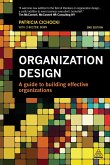Doug Strycharczyk, Charles Elvin
Developing Resilient Organizations
How to Create an Adaptive, High-Performance and Engaged Organization
Doug Strycharczyk, Charles Elvin
Developing Resilient Organizations
How to Create an Adaptive, High-Performance and Engaged Organization
- Broschiertes Buch
- Merkliste
- Auf die Merkliste
- Bewerten Bewerten
- Teilen
- Produkt teilen
- Produkterinnerung
- Produkterinnerung
Much of the fear and uncertainty surrounding the global recession is concerned with the adverse impact it will have on organisations and society. However, recessions are nothing new. We know from past experience that when a recession is over, there always emerge organisations and individuals who have not only survived but have thrived. They often emerge stronger, fitter and better performing. Developing Resilient Organizations argues that one of the fundamental keys to survival in these circumstances is resilience or mental toughness. It can make challenge and change an opportunity rather than…mehr
Andere Kunden interessierten sich auch für
![Resilient Organizations Resilient Organizations]() Erica SevilleResilient Organizations44,99 €
Erica SevilleResilient Organizations44,99 €![The Resilient Culture The Resilient Culture]() Liane StephanThe Resilient Culture18,99 €
Liane StephanThe Resilient Culture18,99 €![Resilient Culture Resilient Culture]() Liane StephanResilient Culture89,99 €
Liane StephanResilient Culture89,99 €![Armstrong on Reinventing Performance Management Armstrong on Reinventing Performance Management]() Michael ArmstrongArmstrong on Reinventing Performance Management46,99 €
Michael ArmstrongArmstrong on Reinventing Performance Management46,99 €![Organizational Management Organizational Management]() Peter StokesOrganizational Management56,99 €
Peter StokesOrganizational Management56,99 €![Future Cultures Future Cultures]() Scott SmithFuture Cultures85,99 €
Scott SmithFuture Cultures85,99 €![Organization Design Organization Design]() Patricia CichockiOrganization Design34,99 €
Patricia CichockiOrganization Design34,99 €-
-
-
Much of the fear and uncertainty surrounding the global recession is concerned with the adverse impact it will have on organisations and society. However, recessions are nothing new. We know from past experience that when a recession is over, there always emerge organisations and individuals who have not only survived but have thrived. They often emerge stronger, fitter and better performing. Developing Resilient Organizations argues that one of the fundamental keys to survival in these circumstances is resilience or mental toughness. It can make challenge and change an opportunity rather than a threat. The book addresses a wide variety of organizational issues including motivation, performance, staff retention, behaviour, trust, attention span and teamwork. With case studies from leading organizations across the public and private sector internationally, it will show you how to develop organizational performance, well being and a positive approach to adversity and change in your organization.
Hinweis: Dieser Artikel kann nur an eine deutsche Lieferadresse ausgeliefert werden.
Hinweis: Dieser Artikel kann nur an eine deutsche Lieferadresse ausgeliefert werden.
Produktdetails
- Produktdetails
- Verlag: Kogan Page
- Seitenzahl: 266
- Erscheinungstermin: 1. August 2014
- Englisch
- Abmessung: 234mm x 156mm x 14mm
- Gewicht: 409g
- ISBN-13: 9780749470098
- ISBN-10: 0749470097
- Artikelnr.: 37665790
- Herstellerkennzeichnung
- Libri GmbH
- Europaallee 1
- 36244 Bad Hersfeld
- gpsr@libri.de
- Verlag: Kogan Page
- Seitenzahl: 266
- Erscheinungstermin: 1. August 2014
- Englisch
- Abmessung: 234mm x 156mm x 14mm
- Gewicht: 409g
- ISBN-13: 9780749470098
- ISBN-10: 0749470097
- Artikelnr.: 37665790
- Herstellerkennzeichnung
- Libri GmbH
- Europaallee 1
- 36244 Bad Hersfeld
- gpsr@libri.de
Doug Strycharczyk is Managing Director of AQR a consultancy that works to improve the 'mental toughness' of organizations. Before he founded AQR in 1989 he held a variety of HR and consultancy roles in the private and public sectors. These include Castrol (UK) Limited, Goodyear Tyres, Decca Ltd, J Wedgwood Ltd and the Burton Group. He was the Head of Operations for Castrol (UK) Ltd at the same time as being Head of HR. He is the co-author of Developing Mental Toughness with Peter Clough and a contributor to Psychometrics in Coaching, both published by Kogan Page. Charles Elvin is Chief Executive of the Institute of Leadership and Management (ILM). He is a highly experienced Director achieving significant commercial results in the business services sector, in particular driving revenue and profit growth in the learning, training and professional development industry. Previous roles include Director of the B2B Division of the Open University, leading the British Standard Institution global commercial learning and training business, and senior roles in leading blue chip companies including UBS and RM.
About the authors
Acknowledgements
Introduction
PART ONE Change in the 21st century
01 A general overview
Doug Strycharczyk, CEO of AQR International
In the beginning...
So what is this book about?
A word about the authors and editors
References
02 The new factors
Doug Strycharczyk, CEO of AQR International
The employee relationship
What is the nature of change?
New generations, new attitudes
Employability - what this means
References
03 Mental toughness
Professor Peter Clough, Chair of Applied Psychology at Manchester
Metropolitan University, Dr Fiona Earle, Chartered Occupational
Psychologist and Psychology Lecturer at the University of Hull, Dr Keith,
Chartered Sport and Exercise Psychologist and Senior Lecturer at the
University of Hull, Dr John Perry, Senior Lecturer in Sport and Exercise
Psychology at Leeds Trinity University, and Doug Strycharczyk, CEO of AQR
International
What is mental toughness?
What is the 4 Cs model of mental toughness?
Measuring mental toughness
Can mental toughness be integrated with the core models prevalent in
occupational and in sport psychology?
Can we develop a mentally-tough organization?
Some final thoughts
An important point
So... what about the future?
References
04 Trust-based leadership and resilient organizations in the 21st century
Charles Elvin, CEO of the Institute of Leadership and Management
Surviving the unexpected
Two categories of trust relevant to organizational resilience
Suggestions on developing trust
Final comments
Measuring trust - the Institute of Leadership and Management Index of
Leadership Trust
References
05 Leadership, resilience and the 21st-century organization
Professor Sharon Turnbull, Associate Head of Research at The Leadership
Trust and Rob Noble, Chief Executive of The Leadership Trust
What is changing in the 21st century and why?
So how can such multi-dimensional leadership be developed for these
21st-century challenges?
What kind of leadership might be needed for the 21st century?
New forms of leadership require new forms of leadership development
What does existing research tells us about leadership development for
resilient organizations?
What are the essential elements of effective leadership development for
resilient 21st-century organizations?
Conclusions
References
PART TWO Practitioner perspectives
06 Leadership and the BP grit in the oyster - developing mental toughness
Jo Shuttlewood, Lead Coach and Founder of Perform-In-Business and Rachel
Billington
What was the idea?
What happened?
It's not what you do, it's the way that you do it
Yes, but what do you do?
What changed?
So how can developing mental toughness help organizations grow outstanding
leaders - particularly those suited to the challenges of the future?
What questions are we left with?
How do we humanize leadership development?
What do we need to do in order to help people fulfil their leadership
potential?
How do we encourage organizations to grow?
What are the challenges for organizations as they seek to grow into the
future?
Then how do we develop structures and practices that genuinely reflect the
human culture we believe we want?
References
07 Changing times for the public sector
Zoe Sweet, Director of Organizational Development at Academi Wales and Jo
Carruthers, Director of Academi Wales
Leadership
The changing role of the public sector in the 21st century
PSMW/Academi Wales
How does Wales now build the leaders of the future?
Meeting the challenge
Managing Change Successfully
Conclusion
Looking ahead
References
08 New realities: personal growth for an uncertain future
Sue Pinder, Former Principal at James Watt College, Raymond Robertson,
Founding Director of Halogen Communications Ltd., and Craig Thomson,
Education Expert
Learning for life at the top
Extending and reshaping the essence
The harsh realities of the 21st century - a changed and changing world
This time it's personal
Learning for a world of new realities
References
09 Ethics, ethical practice and their growing importance in developing
sustainably performing organizations in the 21st century
Richard Cresswell, Fellow of the Institute of Leadership and Management and
Murray Clark, Principal Lecturer of Organizational Theory and Research
Methodology at Sheffield Business School, Sheffield Hallam University
Introduction
Theme 1: Ethics and ethical behaviour
Theme 2: Key ethical theories
Theme 3: Business challenges and leadership behaviour
Theme 4: Ethics, resilience and sustainability
Conclusions
References
10 Big data, big business
Andrew Cuthbert, Entrepreneur
Big data and the fifth 'V'
From insight to influence: Steve Jobs v Silicon Valley
The economics of data: An example and a comparison
Social networks, social change
Creating a new God?
The user profile: Unlocking economic potential
Making the connections: Analyst as consumer
Finally: Hunting the new Yukon
References
Conclusions
Doug Strycharczyk, CEO of AQR International and Charles Elvin, CEO of the
Institute of Leadership and Management
Index
Acknowledgements
Introduction
PART ONE Change in the 21st century
01 A general overview
Doug Strycharczyk, CEO of AQR International
In the beginning...
So what is this book about?
A word about the authors and editors
References
02 The new factors
Doug Strycharczyk, CEO of AQR International
The employee relationship
What is the nature of change?
New generations, new attitudes
Employability - what this means
References
03 Mental toughness
Professor Peter Clough, Chair of Applied Psychology at Manchester
Metropolitan University, Dr Fiona Earle, Chartered Occupational
Psychologist and Psychology Lecturer at the University of Hull, Dr Keith,
Chartered Sport and Exercise Psychologist and Senior Lecturer at the
University of Hull, Dr John Perry, Senior Lecturer in Sport and Exercise
Psychology at Leeds Trinity University, and Doug Strycharczyk, CEO of AQR
International
What is mental toughness?
What is the 4 Cs model of mental toughness?
Measuring mental toughness
Can mental toughness be integrated with the core models prevalent in
occupational and in sport psychology?
Can we develop a mentally-tough organization?
Some final thoughts
An important point
So... what about the future?
References
04 Trust-based leadership and resilient organizations in the 21st century
Charles Elvin, CEO of the Institute of Leadership and Management
Surviving the unexpected
Two categories of trust relevant to organizational resilience
Suggestions on developing trust
Final comments
Measuring trust - the Institute of Leadership and Management Index of
Leadership Trust
References
05 Leadership, resilience and the 21st-century organization
Professor Sharon Turnbull, Associate Head of Research at The Leadership
Trust and Rob Noble, Chief Executive of The Leadership Trust
What is changing in the 21st century and why?
So how can such multi-dimensional leadership be developed for these
21st-century challenges?
What kind of leadership might be needed for the 21st century?
New forms of leadership require new forms of leadership development
What does existing research tells us about leadership development for
resilient organizations?
What are the essential elements of effective leadership development for
resilient 21st-century organizations?
Conclusions
References
PART TWO Practitioner perspectives
06 Leadership and the BP grit in the oyster - developing mental toughness
Jo Shuttlewood, Lead Coach and Founder of Perform-In-Business and Rachel
Billington
What was the idea?
What happened?
It's not what you do, it's the way that you do it
Yes, but what do you do?
What changed?
So how can developing mental toughness help organizations grow outstanding
leaders - particularly those suited to the challenges of the future?
What questions are we left with?
How do we humanize leadership development?
What do we need to do in order to help people fulfil their leadership
potential?
How do we encourage organizations to grow?
What are the challenges for organizations as they seek to grow into the
future?
Then how do we develop structures and practices that genuinely reflect the
human culture we believe we want?
References
07 Changing times for the public sector
Zoe Sweet, Director of Organizational Development at Academi Wales and Jo
Carruthers, Director of Academi Wales
Leadership
The changing role of the public sector in the 21st century
PSMW/Academi Wales
How does Wales now build the leaders of the future?
Meeting the challenge
Managing Change Successfully
Conclusion
Looking ahead
References
08 New realities: personal growth for an uncertain future
Sue Pinder, Former Principal at James Watt College, Raymond Robertson,
Founding Director of Halogen Communications Ltd., and Craig Thomson,
Education Expert
Learning for life at the top
Extending and reshaping the essence
The harsh realities of the 21st century - a changed and changing world
This time it's personal
Learning for a world of new realities
References
09 Ethics, ethical practice and their growing importance in developing
sustainably performing organizations in the 21st century
Richard Cresswell, Fellow of the Institute of Leadership and Management and
Murray Clark, Principal Lecturer of Organizational Theory and Research
Methodology at Sheffield Business School, Sheffield Hallam University
Introduction
Theme 1: Ethics and ethical behaviour
Theme 2: Key ethical theories
Theme 3: Business challenges and leadership behaviour
Theme 4: Ethics, resilience and sustainability
Conclusions
References
10 Big data, big business
Andrew Cuthbert, Entrepreneur
Big data and the fifth 'V'
From insight to influence: Steve Jobs v Silicon Valley
The economics of data: An example and a comparison
Social networks, social change
Creating a new God?
The user profile: Unlocking economic potential
Making the connections: Analyst as consumer
Finally: Hunting the new Yukon
References
Conclusions
Doug Strycharczyk, CEO of AQR International and Charles Elvin, CEO of the
Institute of Leadership and Management
Index
About the authors
Acknowledgements
Introduction
PART ONE Change in the 21st century
01 A general overview
Doug Strycharczyk, CEO of AQR International
In the beginning...
So what is this book about?
A word about the authors and editors
References
02 The new factors
Doug Strycharczyk, CEO of AQR International
The employee relationship
What is the nature of change?
New generations, new attitudes
Employability - what this means
References
03 Mental toughness
Professor Peter Clough, Chair of Applied Psychology at Manchester
Metropolitan University, Dr Fiona Earle, Chartered Occupational
Psychologist and Psychology Lecturer at the University of Hull, Dr Keith,
Chartered Sport and Exercise Psychologist and Senior Lecturer at the
University of Hull, Dr John Perry, Senior Lecturer in Sport and Exercise
Psychology at Leeds Trinity University, and Doug Strycharczyk, CEO of AQR
International
What is mental toughness?
What is the 4 Cs model of mental toughness?
Measuring mental toughness
Can mental toughness be integrated with the core models prevalent in
occupational and in sport psychology?
Can we develop a mentally-tough organization?
Some final thoughts
An important point
So... what about the future?
References
04 Trust-based leadership and resilient organizations in the 21st century
Charles Elvin, CEO of the Institute of Leadership and Management
Surviving the unexpected
Two categories of trust relevant to organizational resilience
Suggestions on developing trust
Final comments
Measuring trust - the Institute of Leadership and Management Index of
Leadership Trust
References
05 Leadership, resilience and the 21st-century organization
Professor Sharon Turnbull, Associate Head of Research at The Leadership
Trust and Rob Noble, Chief Executive of The Leadership Trust
What is changing in the 21st century and why?
So how can such multi-dimensional leadership be developed for these
21st-century challenges?
What kind of leadership might be needed for the 21st century?
New forms of leadership require new forms of leadership development
What does existing research tells us about leadership development for
resilient organizations?
What are the essential elements of effective leadership development for
resilient 21st-century organizations?
Conclusions
References
PART TWO Practitioner perspectives
06 Leadership and the BP grit in the oyster - developing mental toughness
Jo Shuttlewood, Lead Coach and Founder of Perform-In-Business and Rachel
Billington
What was the idea?
What happened?
It's not what you do, it's the way that you do it
Yes, but what do you do?
What changed?
So how can developing mental toughness help organizations grow outstanding
leaders - particularly those suited to the challenges of the future?
What questions are we left with?
How do we humanize leadership development?
What do we need to do in order to help people fulfil their leadership
potential?
How do we encourage organizations to grow?
What are the challenges for organizations as they seek to grow into the
future?
Then how do we develop structures and practices that genuinely reflect the
human culture we believe we want?
References
07 Changing times for the public sector
Zoe Sweet, Director of Organizational Development at Academi Wales and Jo
Carruthers, Director of Academi Wales
Leadership
The changing role of the public sector in the 21st century
PSMW/Academi Wales
How does Wales now build the leaders of the future?
Meeting the challenge
Managing Change Successfully
Conclusion
Looking ahead
References
08 New realities: personal growth for an uncertain future
Sue Pinder, Former Principal at James Watt College, Raymond Robertson,
Founding Director of Halogen Communications Ltd., and Craig Thomson,
Education Expert
Learning for life at the top
Extending and reshaping the essence
The harsh realities of the 21st century - a changed and changing world
This time it's personal
Learning for a world of new realities
References
09 Ethics, ethical practice and their growing importance in developing
sustainably performing organizations in the 21st century
Richard Cresswell, Fellow of the Institute of Leadership and Management and
Murray Clark, Principal Lecturer of Organizational Theory and Research
Methodology at Sheffield Business School, Sheffield Hallam University
Introduction
Theme 1: Ethics and ethical behaviour
Theme 2: Key ethical theories
Theme 3: Business challenges and leadership behaviour
Theme 4: Ethics, resilience and sustainability
Conclusions
References
10 Big data, big business
Andrew Cuthbert, Entrepreneur
Big data and the fifth 'V'
From insight to influence: Steve Jobs v Silicon Valley
The economics of data: An example and a comparison
Social networks, social change
Creating a new God?
The user profile: Unlocking economic potential
Making the connections: Analyst as consumer
Finally: Hunting the new Yukon
References
Conclusions
Doug Strycharczyk, CEO of AQR International and Charles Elvin, CEO of the
Institute of Leadership and Management
Index
Acknowledgements
Introduction
PART ONE Change in the 21st century
01 A general overview
Doug Strycharczyk, CEO of AQR International
In the beginning...
So what is this book about?
A word about the authors and editors
References
02 The new factors
Doug Strycharczyk, CEO of AQR International
The employee relationship
What is the nature of change?
New generations, new attitudes
Employability - what this means
References
03 Mental toughness
Professor Peter Clough, Chair of Applied Psychology at Manchester
Metropolitan University, Dr Fiona Earle, Chartered Occupational
Psychologist and Psychology Lecturer at the University of Hull, Dr Keith,
Chartered Sport and Exercise Psychologist and Senior Lecturer at the
University of Hull, Dr John Perry, Senior Lecturer in Sport and Exercise
Psychology at Leeds Trinity University, and Doug Strycharczyk, CEO of AQR
International
What is mental toughness?
What is the 4 Cs model of mental toughness?
Measuring mental toughness
Can mental toughness be integrated with the core models prevalent in
occupational and in sport psychology?
Can we develop a mentally-tough organization?
Some final thoughts
An important point
So... what about the future?
References
04 Trust-based leadership and resilient organizations in the 21st century
Charles Elvin, CEO of the Institute of Leadership and Management
Surviving the unexpected
Two categories of trust relevant to organizational resilience
Suggestions on developing trust
Final comments
Measuring trust - the Institute of Leadership and Management Index of
Leadership Trust
References
05 Leadership, resilience and the 21st-century organization
Professor Sharon Turnbull, Associate Head of Research at The Leadership
Trust and Rob Noble, Chief Executive of The Leadership Trust
What is changing in the 21st century and why?
So how can such multi-dimensional leadership be developed for these
21st-century challenges?
What kind of leadership might be needed for the 21st century?
New forms of leadership require new forms of leadership development
What does existing research tells us about leadership development for
resilient organizations?
What are the essential elements of effective leadership development for
resilient 21st-century organizations?
Conclusions
References
PART TWO Practitioner perspectives
06 Leadership and the BP grit in the oyster - developing mental toughness
Jo Shuttlewood, Lead Coach and Founder of Perform-In-Business and Rachel
Billington
What was the idea?
What happened?
It's not what you do, it's the way that you do it
Yes, but what do you do?
What changed?
So how can developing mental toughness help organizations grow outstanding
leaders - particularly those suited to the challenges of the future?
What questions are we left with?
How do we humanize leadership development?
What do we need to do in order to help people fulfil their leadership
potential?
How do we encourage organizations to grow?
What are the challenges for organizations as they seek to grow into the
future?
Then how do we develop structures and practices that genuinely reflect the
human culture we believe we want?
References
07 Changing times for the public sector
Zoe Sweet, Director of Organizational Development at Academi Wales and Jo
Carruthers, Director of Academi Wales
Leadership
The changing role of the public sector in the 21st century
PSMW/Academi Wales
How does Wales now build the leaders of the future?
Meeting the challenge
Managing Change Successfully
Conclusion
Looking ahead
References
08 New realities: personal growth for an uncertain future
Sue Pinder, Former Principal at James Watt College, Raymond Robertson,
Founding Director of Halogen Communications Ltd., and Craig Thomson,
Education Expert
Learning for life at the top
Extending and reshaping the essence
The harsh realities of the 21st century - a changed and changing world
This time it's personal
Learning for a world of new realities
References
09 Ethics, ethical practice and their growing importance in developing
sustainably performing organizations in the 21st century
Richard Cresswell, Fellow of the Institute of Leadership and Management and
Murray Clark, Principal Lecturer of Organizational Theory and Research
Methodology at Sheffield Business School, Sheffield Hallam University
Introduction
Theme 1: Ethics and ethical behaviour
Theme 2: Key ethical theories
Theme 3: Business challenges and leadership behaviour
Theme 4: Ethics, resilience and sustainability
Conclusions
References
10 Big data, big business
Andrew Cuthbert, Entrepreneur
Big data and the fifth 'V'
From insight to influence: Steve Jobs v Silicon Valley
The economics of data: An example and a comparison
Social networks, social change
Creating a new God?
The user profile: Unlocking economic potential
Making the connections: Analyst as consumer
Finally: Hunting the new Yukon
References
Conclusions
Doug Strycharczyk, CEO of AQR International and Charles Elvin, CEO of the
Institute of Leadership and Management
Index

